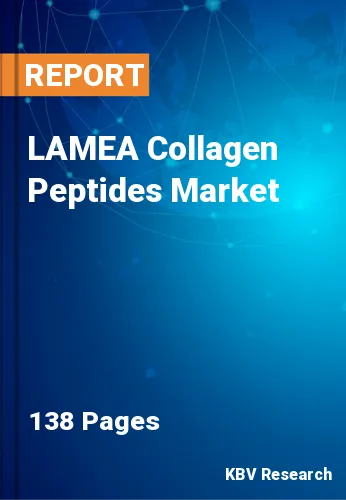The Latin America, Middle East and Africa Collagen Peptides Market would witness market growth of 8.3% CAGR during the forecast period (2023-2030).In the year 2026, the LAMEA market's volume is expected to surge to 6,399.2 tonnes, showcasing a growth of 9.7% (2023-2030).
The primary factor anticipated to propel the market growth during the projection period is an increase in awareness regarding the health advantages of consuming collagen peptides. Additionally, the extensive use of collagen peptides across several industries, including food and beverage, cosmetics, meat and poultry, and sports nutrition, is expected to drive the market's revenue growth during the forecast period. In coming years, the rapid demand for supplements to maintain health and nutritional intake would offer beneficial chances for major players to sustain the pace of the market.
Collagen peptide supplements may also enhance how muscles interact with joints and grow. This is then expected to be one of the main reasons for an increase in the use of collagen peptides in the healthcare industry. The use of microencapsulation technology is a further significant trend. The market will continue to develop as this technology improves the stability and bioavailability of collagen peptides. As customers increasingly seek products that offer many health benefits, the development of collagen peptide blends that combine additional functional components is also anticipated to propel market expansion.
A sizeable fraction of the population in this region suffers from obesity. As per the National Library of Medicine, 3% and 18% of girls and 5% and 14% of boys in Gulf countries are obese as children and teenagers. In addition, prevalence rates for obesity in the Gulf region range from 1% to 30%, with adult female obesity rates ranging from 2% to 55% and adult male obesity rates from 1% to 30%. Along with the increase in fat, obesity can cause muscle loss. It offers vital amino acids necessary for preserving and increasing lean muscle mass, which is advantageous for general metabolism and weight control. As a result, it is predicted that the region's rising rate of obesity will support this market in LAMEA.
The Brazil market dominated the LAMEA Collagen Peptides Market by Country in 2022 and would continue to be a dominant market till 2030; thereby, achieving a market value of $22.5 million by 2030. The Argentina market is estimated to grow at a CAGR of 8.9% during (2023 - 2030). Additionally, The UAE market would exhibit a CAGR of 7.5% during (2023 - 2030).
Based on Application, the market is segmented into Nutritional Products, Food & Beverage, Cosmetics & Personal Care, and Others. Based on Source, the market is segmented into Bovine, Porcine, and Marine & Poultry. Based on Form, the market is segmented into Liquid, and Dry. Based on countries, the market is segmented into Brazil, Argentina, UAE, Egypt, South Africa, Nigeria, and Rest of LAMEA.
Free Valuable Insights: The Worldwide Collagen Peptides Market is Projected to reach USD 1.05 Billion by 2030, at a CAGR of 6.2%
The market research report covers the analysis of key stakeholders of the market. Key companies profiled in the report include Tessenderlo Group NV, Gelita AG, Darling Ingredients, Inc., Nitta Gelatin, Inc., BioCell Technology LLC, Lapi Gelatine S.p.a (Lapi Group), SAS Gelatines Weishardt, Viscofan, S.A., Amicogen Co., Ltd., and Foodmate Co., Ltd. (Foodchem Group)
By Application (Volume, Tonnes, USD Million, 2019-2030)
By Source (Volume, Tonnes, USD Million, 2019-2030)
By Form
By Country (Volume, Tonnes, USD Million, 2019-2030)
Our team of dedicated experts can provide you with attractive expansion opportunities for your business.

